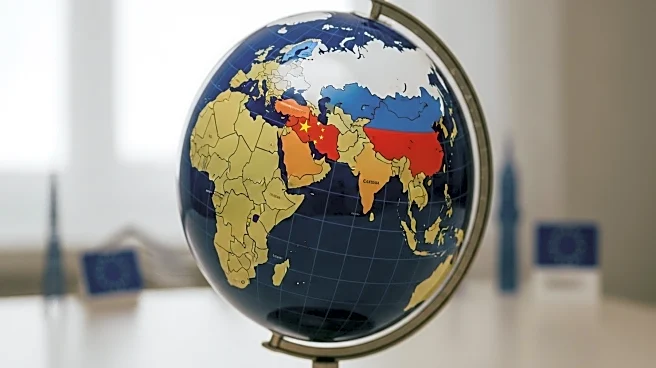What is the story about?
What's Happening?
The European Commission has announced a new package of sanctions against Russia, marking the 19th such measure since Russia's full-scale invasion of Ukraine three years ago. This package includes a $47.60 oil price cap, asset freezes against companies, and sanctions against the shadow fleet of aging vessels shipping Russian oil in violation of G7 restrictions. Additionally, the EU plans to accelerate its proposed ban on Russian LNG by one year, moving the deadline to late 2026. The sanctions also target 118 additional vessels from the shadow fleet, bringing the total to over 560 vessels under EU sanctions. Major energy companies Rosneft and Gazpromneft will face a full transaction ban, and other companies will have their assets frozen. For the first time, the EU's restrictive measures will impact crypto platforms, prohibiting transactions in cryptocurrencies, and listing foreign banks connected to Russian alternative payment service systems.
Why It's Important?
These sanctions represent a significant escalation in the EU's efforts to pressure Russia economically and diplomatically. By targeting Chinese entities, the EU is broadening the scope of its sanctions, potentially affecting international trade dynamics. The inclusion of crypto platforms in the sanctions highlights the EU's recognition of the evolving financial landscape and the need to address non-traditional financial systems. The sanctions could further isolate Russia economically, impacting its ability to sustain its military operations in Ukraine. The measures also reflect the EU's commitment to supporting Ukraine and maintaining international law, as stated by Ursula von der Leyen, the Commission president.
What's Next?
The sanctions package requires approval from all 27 EU member countries, which is expected to occur in the coming weeks. The EU's actions may prompt responses from Russia and potentially China, given the targeting of Chinese entities. The international community will be watching closely to see how these sanctions affect Russia's economy and its geopolitical strategies. Further developments in the sanctions area are anticipated, as indicated by Ukraine's sanctions commissioner Vladyslav Vlasiuk.
Beyond the Headlines
The sanctions could have long-term implications for international relations, particularly between the EU, Russia, and China. The targeting of crypto platforms may set a precedent for future regulatory measures in the digital financial space. Additionally, the sanctions could influence global energy markets, especially with the accelerated ban on Russian LNG.


















